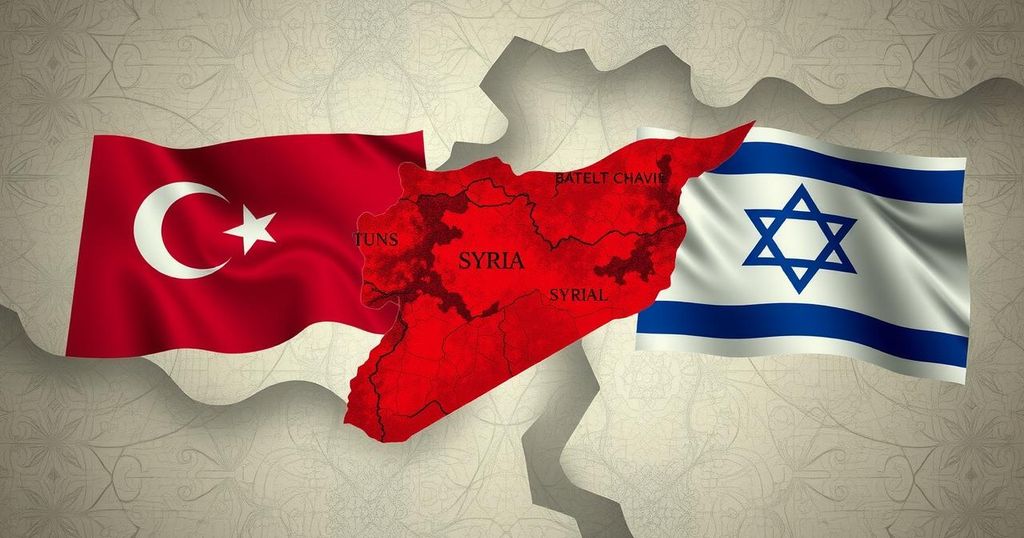Syria’s Future After al-Assad: The Rivalry Between Turkiye and Israel

Bashar al-Assad’s ousting on December 8, 2024, marks a crucial shift in Syria’s history, wherein Turkiye and Israel are asserting conflicting influences. Turkiye aims to counter Kurdish power through military campaigns, while Israel focuses on limiting Iranian entrenchment. President Ahmed al-Sharaa must navigate relationships with both nations amid ongoing regional complexities and the interests of external powers. The new dynamics promise a transformative and uncertain future for Syria.
The recent removal of President Bashar al-Assad on December 8, 2024, signifies a pivotal moment in Syrian history, ushering in potential changes shaped by regional dynamics. Concurrently, both Turkiye and Israel are exerting their influence, with conflicting objectives that may redefine Syria’s future and affect Middle Eastern stability for years to come. This shift in power is expected to have lasting repercussions for the region.
In the context of the ongoing Syrian civil war, which has persisted since 2011, Turkiye has emerged as a significant actor. Initially supporting groups opposing al-Assad, Ankara’s focus has evolved towards preventing the formation of a Kurdish entity along its southern border, which it perceives as a security threat. Consequently, Turkiye has intensified military operations in northern Syria, notably launching the Manbij offensive in December 2024, aimed at seizing territory from the Syrian Democratic Forces (SDF).
In its campaign, Turkiye has executed numerous airstrikes targeting SDF positions, which it associates with the Kurdistan Workers’ Party (PKK). This has resulted in over 150 drone strikes between December 2024 and March 2025, leading to casualties among both Kurds and civilians. The Turkish government aims to dismantle Kurdish governance in northern Syria while bolstering its military footprint with over 10,000 troops and plans to build multiple military outposts.
On the other hand, Israel’s strategy post-al-Assad emphasizes preventing Iranian and Hezbollah influence in Syria. With the leadership shift, Israel has escalated airstrikes aimed at Iranian and Hezbollah targets, conducting over 80 strikes in the same period. These operations aim to disrupt Iranian logistical networks and thwart Hezbollah’s activities, addressing the perceived threats to Israeli security.
As President Ahmed al-Sharaa navigates this new political landscape, he faces the challenge of balancing relations with both Turkiye and Israel, whose interests often conflict. While Damascus asserts sovereignty over Turkish military presence, an understanding is needed to stabilize the region. Negotiations are ongoing, but uncertainties remain regarding Turkey’s military status.
Al-Sharaa’s administration has indicated a shift from its predecessor’s alignment with Iran towards a more pragmatic approach with Israel, yet direct diplomatic engagement remains elusive. Reports of backchannel discussions exist, but concrete advancements are hindered by security concerns, particularly regarding Iranian military presence in Syria.
While Israel and Turkiye remain ostensibly allied against mutual threats, rising tensions exist, especially concerning Turkiye’s support for opposition forces perceived as potential threats to Israel. Additionally, an intelligence war appears to be developing, with each country monitoring the other’s operations closely, particularly regarding military assets in Syria.
Despite their separate agendas, both nations are navigating a complex web of alliances and rivalries that could lead to indirect conflicts. As Turkiye strengthens its position in northern Syria with Islamist factions, Israeli officials express growing concerns over the ramifications of such developments for regional stability.
As Syria embarks on this new chapter following al-Assad’s ousting, various external actors, including the United States, Iran, and Russia, are also redefining their roles in the region. The United States continues to back the Kurdish forces in the northeast, while Iran is attempting to re-establish its influence post-al-Assad. Russia’s commitment to al-Assad complicates the dynamics further.
In light of shifting Gulf State perspectives, nations like Saudi Arabia and the UAE are reassessing their positions, moving from opposition to engagement with Syria. This pragmatic approach aims to leverage influence rather than risk prolonged isolation, although their support remains strategically motivated rather than based on ideological affinities. How these countries and Syria’s new leadership navigate these multifaceted relationships will significantly impact the country’s immediate and long-term future.
In conclusion, Syria’s future is at a critical juncture following the removal of President Bashar al-Assad. With Turkiye and Israel asserting their competing influences, the evolving power dynamics will significantly impact the region’s stability. The new administration in Syria, led by President Ahmed al-Sharaa, must skillfully manage relationships with these powers while addressing internal challenges. The international landscape, including actors such as the United States, Iran, and Gulf nations, will further complicate Syria’s path towards stability and recovery.
Original Source: shafaq.com







